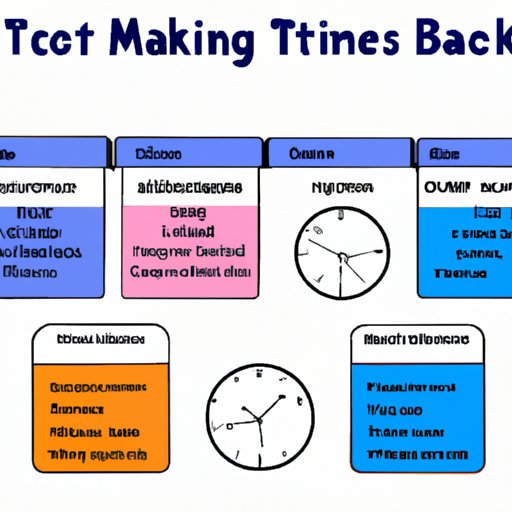Introduction
Time management is the process of organizing and planning how to divide your time between specific activities. Good time management enables you to work smarter – not harder – so that you get more done in less time, even when time is tight and pressures are high. Failing to manage your time can cause you to miss deadlines, fail to achieve your goals, and stress out.
According to a survey conducted by CareerBuilder, nearly half of all employees reported feeling overwhelmed at their job due to poor time management. Additionally, a study from Stanford University found that managing time efficiently can lead to greater productivity, better performance, and improved mental health.
Create a Daily Schedule
The first step to effective time management is creating a daily schedule. Start by making a list of all the tasks that need to be completed each day. Then, prioritize your tasks based on importance and urgency. This will help you identify which tasks should take priority.
Once you have identified the most important tasks, allocate a certain amount of time for each task. It’s important to be realistic about how much time you can realistically devote to each task. To stay organized, create a to-do list that lists all the tasks you want to accomplish each day.
Prioritize Tasks
Once you’ve created a daily schedule, it’s important to prioritize your tasks. This means setting goals and understanding which tasks need immediate attention. When prioritizing, consider the consequences of not completing a task or meeting a deadline. This will help you focus on the tasks that are most important.
It’s also important to delegate tasks if possible. Delegating tasks allows you to focus on the tasks that require your personal attention, while freeing up time to focus on other tasks. Make sure to communicate expectations clearly when delegating tasks.
Eliminate Distractions
Another important aspect of time management is eliminating distractions. This means avoiding multitasking, staying away from social media and other distractions, and developing focus and concentration. Take the time to focus on one task at a time instead of trying to do multiple things at once.
To help eliminate distractions, set aside specific times for checking emails and messages. This will help you stay focused on the tasks at hand without getting sidetracked.
Set Deadlines
Setting deadlines is another important part of effective time management. Establishing realistic deadlines helps keep you motivated and accountable. Break down big tasks into smaller steps and set a timeline for each step. This will make it easier to stay on track and complete tasks in a timely manner.
In addition to setting deadlines for yourself, hold yourself accountable. Make sure to track your progress and follow through with any commitments you make. This will help you stay focused and motivated.
Take Breaks
Finally, it’s important to take breaks throughout the day. Scheduling short breaks throughout the day will help you stay energized and productive. During your breaks, take time to relax and recharge. This could include going for a walk, listening to music, or reading a book.
At the end of the day, take a few minutes to evaluate your progress. This will help you identify what went well and what could be improved upon. This will also help you adjust your schedule and plan for the next day.
Conclusion
Time management is an essential skill for achieving success. By creating a daily schedule, prioritizing tasks, eliminating distractions, setting deadlines, and taking breaks, you can manage your time more effectively. These strategies will help you stay organized, motivated, and productive.
Effective time management can improve your performance, increase your productivity, and reduce stress. By following these strategies, you can make the most of your time and get the most out of life.
(Note: Is this article not meeting your expectations? Do you have knowledge or insights to share? Unlock new opportunities and expand your reach by joining our authors team. Click Registration to join us and share your expertise with our readers.)
